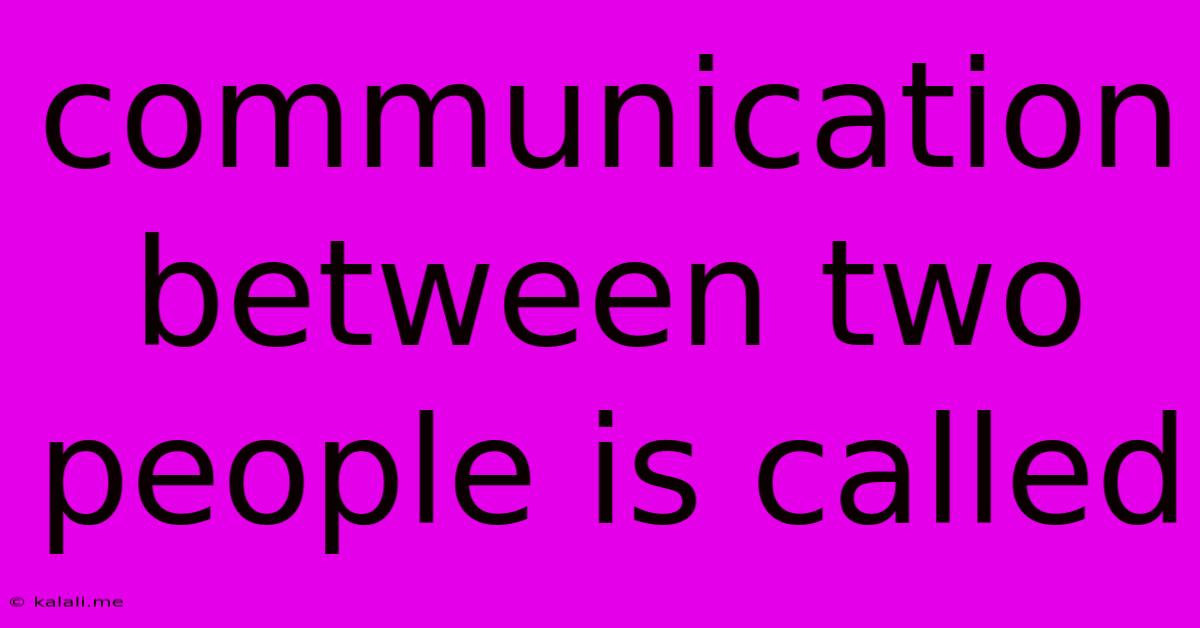Communication Between Two People Is Called
Kalali
Jun 13, 2025 · 3 min read

Table of Contents
Communication Between Two People: Exploring the Dynamics of Dyadic Interaction
Communication is the cornerstone of human interaction, allowing us to share ideas, emotions, and experiences. But what is the specific term for communication involving just two people? This article delves into the fascinating world of dyadic communication, exploring its key characteristics, challenges, and importance in building relationships. Understanding this fundamental form of interaction is crucial for improving personal and professional relationships.
What is Dyadic Communication?
Dyadic communication, simply put, is communication that occurs between two people. It's the most basic form of interpersonal communication, forming the foundation for all more complex interactions. Think of a one-on-one conversation, a phone call between friends, or a meeting between a manager and an employee – these are all examples of dyadic communication. It's characterized by a direct exchange of information, feedback, and meaning between two individuals. This directness allows for a deeper level of understanding and connection than larger group interactions.
Key Characteristics of Dyadic Communication
Several key characteristics distinguish dyadic communication from other forms of communication:
-
Direct Interaction: The primary characteristic is the direct, face-to-face (or technologically mediated equivalent) exchange. This fosters immediate feedback and allows for nonverbal cues to play a significant role.
-
Reciprocal Exchange: Dyadic communication is a two-way street. Both participants actively contribute to the conversation, sharing information and reacting to each other's input. This reciprocal nature creates a dynamic and evolving exchange.
-
Personal Connection: Dyadic interactions often foster a stronger sense of personal connection compared to larger group conversations. The focused nature of the communication allows for a more intimate exchange of ideas and emotions.
-
Flexibility and Adaptability: The intimate nature of dyadic communication allows for greater flexibility and adaptability. The conversation can easily shift based on the participants' responses and changing dynamics.
-
Influence and Impact: The direct nature of the communication allows for a significant degree of influence and impact on both participants. The exchange can significantly shape perceptions, opinions, and actions.
Challenges in Dyadic Communication
While dyadic communication is powerful, it also presents some challenges:
-
Misunderstandings: Despite the direct nature, misunderstandings can still arise due to differing interpretations of verbal and nonverbal cues.
-
Power Dynamics: Imbalances in power between the two participants can skew the communication, leading to unequal participation or dominance by one party.
-
Emotional Intensity: The intimate nature can lead to heightened emotional intensity, which can be positive or negative, depending on the context and the participants' emotional regulation skills.
-
Difficulty in Resolving Conflicts: Disagreements can be more challenging to resolve in dyadic interactions, requiring both parties to actively engage in conflict resolution strategies.
Improving Dyadic Communication
Effective dyadic communication requires conscious effort and skill. Here are some tips for improving your interactions:
-
Active Listening: Pay close attention to what the other person is saying, both verbally and nonverbally.
-
Clear and Concise Communication: Express your thoughts and feelings clearly and concisely, avoiding ambiguity.
-
Empathy and Understanding: Try to understand the other person's perspective and feelings.
-
Respectful Communication: Treat the other person with respect, even when disagreeing.
-
Nonverbal Awareness: Pay attention to your own nonverbal cues and those of the other person.
In conclusion, understanding the dynamics of dyadic communication is crucial for effective interpersonal relationships, both personally and professionally. By mastering the skills of active listening, clear communication, and empathy, you can significantly improve the quality of your interactions and build stronger, more meaningful connections.
Latest Posts
Latest Posts
-
Least Common Multiple Of 5 6 7
Jun 14, 2025
-
How To Find Water Content Of Soil
Jun 14, 2025
-
Hair And Nails Are Mainly Composed Of What Substance
Jun 14, 2025
-
What Is The Atomic Radius Of Hydrogen
Jun 14, 2025
-
What Is The Unit Of Conductance
Jun 14, 2025
Related Post
Thank you for visiting our website which covers about Communication Between Two People Is Called . We hope the information provided has been useful to you. Feel free to contact us if you have any questions or need further assistance. See you next time and don't miss to bookmark.